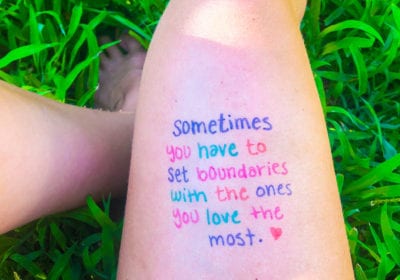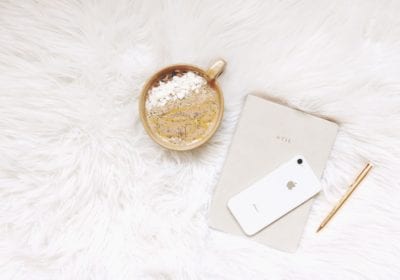Mental Health Lessons
Learned from Sober January
What would it be like to dedicate a whole month to not drinking (or engaging in any other mind-altering substance)? Stone-cold sober. Been there, done that, and I have some mind-shifting lessons to share.
A whole month of sobriety?! To some, this is a small feat, and to others, it’s a prison sentence. Sober January is a trend that is sweeping America and one that can teach us many lessons if we let it.
It all began one cold December morning after another night of one to many holiday drinks. My boyfriend turned to me and suggested we commit to sober January.
Hmmm, what an idea. We had tried the year before and failed after one too many drink-fueled social occasions. Could we do it this year?
For me, too much alcohol brings a nasty anxiety hangover. Mood swings, emotional dysregulation, racing heart rate, anxiety attacks, you name it – and I am not the only one.
After my first blog post about alcohol anxiety, you all at Chill Chief came pouring out of every social platform to share your stories of alcohol anxiety.
So if alcohol causes us so much anxiety, why do we drink? More than that, what would life be like if we didn’t drink? Let me walk you through my journey, and hopefully, it provides some insights into yours.
Lessons learned from a very sober January.
Most social occasions involve alcohol…
Alcohol has been a part of human culture for over 9,000 years. That is a very long time. When I searched “the history of alcohol,” there is zero doubt that alcohol largely drives our social culture.
Alcohol brings a sense of comradery, bonding, and the warm fuzzy feelings of “we are in this together.”
Not to mention alcohol is an easy escape for those suffering from social anxiety, turning down the volume of an often too loud inner anxiety critic.
Sober January illuminated the fact that we revolve many of our social outings (at least as 20-something Americans) around drinking. We may be disguising social anxiety or trying to release some inhibitions.
… but we don’t need alcohol to have fun.
The media paints a rose-colored story around alcohol. Often, leaving us thinking there is no fun to be had if alcohol isn’t involved.
I’m calling complete bullshit on this. Not only did I have a blast with friends while sober, but I would dare to say I had a better time.
Sobriety allows us to be more present and aware in situations. This increases our ability to be mindful and be more cognizant of our emotional reactions and internal dialogue.
Contrary to popular belief, drinking does not make you cool, nor does it make things more fun – our attitude does.
No alcohol means no next day anxiety hangovers.
That’s right, you heard it from your neighborhood anxiety veteran. If you are looking to cut out those nasty next day anxiety hangovers, cutting out alcohol does the trick.
Don’t just take it from me. Science has a whole lot to say about alcohol’s effects on mental health.
Alcohol is a depressant drug. It interacts with all types of mood-altering chemicals in the brain like GABA, serotonin, and dopamine. The aftereffects of a night of drinking can have real consequences, especially if we are already prone to anxiety.
If this sounds like you, this series of articles written with Registered Dietician, Jordan Hostetler, is a great place to explore.
- Go-To Anxiety Hangover Cures Recommended by the Pros
- Expert Drinking Tips for Alcohol-Induced Anxiety
- How to Account for Safe Drinking Practices in a Wellness Plan
All or nothing may not be the best approach.
After all the gibber jabber about how grand sober January was, one aspect was glaringly obvious – an “all or nothing” approach is not for everyone.
There are numerous wellness and mental health advocates out there that are 100% sober. That doesn’t mean that sober living is the only way to care for our minds and bodies.
For me, an all or nothing approach is too strict. A couple of glasses of wine after a long day or the occasional outing with friends helps fuel a vital part of my life – social wellness.
So if “all or nothing” doesn’t work for you, maybe it’s time to try out the old greek saying “nothing in excess.”
Unpleasant feelings get us reaching for the bottle.
Anxious about work? Sip some wine. Nursing a break-up? Take a shot! Bored at home? Grab a beer.
Unpleasant feelings rise up, and then comes the glass. When we push the glass aside and investigate our feelings instead, all sorts of magical things start to happen.
Instead of escaping, sober January helped me lean into these unpleasant feelings.
Work stress became an understanding of my work ethic and desire to do a good job. Overwhelm became a signal to slow down and rest.
Are your unpleasant emotions sending you a message? Maybe leaning in could make a difference.
Sugar… the undercover enemy.
One extremely unexpected side effect of sober January wasn’t about drinking alcohol at all. It was about eating sweets.
While I cut back on alcohol, I gave myself a lot of wiggle room to eat desserts. Put down one vice and pick up another – not recommended.
Sugar put me through the wringer when it came to anxiety. As I picked my brain trying to determine what shifted about my routine, one thing stood out above all else.
Sugar.
Sugar affects our brains, creating a crash after the high and can weaken our body’s ability to respond to stress.
All I have to say is, lesson learned. Less sugar makes a happier me.



